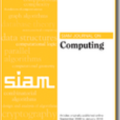We establish the first general connection between the design of quantum algorithms and circuit lower bounds. Specifically, let $\mathfrak{C}$ be a class of polynomial-size concepts, and suppose that $\mathfrak{C}$ can be PAC-learned with membership queries under the uniform distribution with error $1/2 - \gamma$ by a time $T$ quantum algorithm. We prove that if $\gamma^2 \cdot T \ll 2^n/n$, then $\mathsf{BQE} \nsubseteq \mathfrak{C}$, where $\mathsf{BQE} = \mathsf{BQTIME}[2^{O(n)}]$ is an exponential-time analogue of $\mathsf{BQP}$. This result is optimal in both $\gamma$ and $T$, since it is not hard to learn any class $\mathfrak{C}$ of functions in (classical) time $T = 2^n$ (with no error), or in quantum time $T = \mathsf{poly}(n)$ with error at most $1/2 - \Omega(2^{-n/2})$ via Fourier sampling. In other words, even a marginal improvement on these generic learning algorithms would lead to major consequences in complexity theory. Our proof builds on several works in learning theory, pseudorandomness, and computational complexity, and crucially, on a connection between non-trivial classical learning algorithms and circuit lower bounds established by Oliveira and Santhanam (CCC 2017). Extending their approach to quantum learning algorithms turns out to create significant challenges. To achieve that, we show among other results how pseudorandom generators imply learning-to-lower-bound connections in a generic fashion, construct the first conditional pseudorandom generator secure against uniform quantum computations, and extend the local list-decoding algorithm of Impagliazzo, Jaiswal, Kabanets and Wigderson (SICOMP 2010) to quantum circuits via a delicate analysis. We believe that these contributions are of independent interest and might find other applications.
翻译:我们建立了量子算法设计与电路下界之间的第一个一般连接。 具体地说, $\ mathfrak{C} 美元是一个多式数级数级数级数级数级数级数级数级数级数级数级数级数级数级数级数级数级数级数级数级数级数级数级数级数级数级数级数级数级数级数级数级数级数级数级数级数级数级数级数级数级数级数级数级数级数级数级数级数级数级数级数级数级数级数级数级数级数级数级数级数级数级数级数级数级数级数级数级数级数级数级数组数级数级数级数级数级数级数级数级数级数级数组数级数级数组数级数级数级数级数( 数级数级数级数级数组数级数级数级数级数级数级数级数级数级数级数级数级数级数级数级数级数级数级数级数级数级数级数级数级数级数级数级数级数级数级数级数级数级数级数级数级数级数级数级数级数级数级数级数级数级数级数级数级数级数级数级数级数级数级数级数级数组数级数级数级数级数级数级数级数级数级数级数级数级数级数级数级数级数级数级数级数级数级数级数级数级数级数级数级数级数级数级数级数级数级数级数级数级数级数级数级数级数级数级数级数级数级数级数级数级数级数级数级数级数级数级数级数级数级数级数级数级数级数级数级数级数级数级数级数级数级数级数级数级数级数级数级数级数级数级数级数级数级数级数



